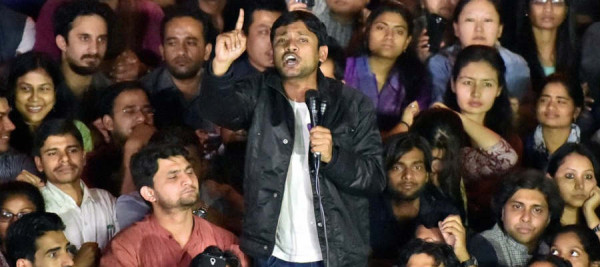BY AMAN LEKHI
How long can one remain a “student”? How good is an institution if a student cannot pass out of it? And who is qualified to lecture on life or the country?
I was curious to know about the student Kanhaiya Kumar. It seems, according to his Wikipedia page, he finished school in 2002 which should make him atleast 31 years old today. The page mentions that thereafter “he moved to Patna and joined College of Commerce” without mentioning the year of joining or completion. I came across an article in The Telegraph (February 19, 2016) which mentioned that he was an undergraduate student at the college between 2003-2007. I will ignore the gap of one year between finishing school and commencing the undergraduate course and also its completion taking a year longer but his Wikipedia Page says “he moved to Delhi and joined JNU” without mentioning the year he so did but mentions “he became President in 2015”.
It has been nine years since he finished graduation (which was after a break of a year and took a year longer than usual) and he is nowhere near completing his PhD. It was in the eight year of his undertaking the PhD course – three years more than the maximum it should take to complete the PhD – that he became the President of the Student Union perhaps because he found studying pointless by then. The PhD itself, incidentally, is not Centre for Political Studies (which deals with subjects of multiculturalism, federalism and social justice) but “African Studies”! The JNU site of Centre for African Studies says that it provides funding support to faculty for field visits to Africa and supports academic activities like research seminars, and publications. It is not known whether Kanhaiya ever visited Africa or he organised any seminars on African studies but the Delhi High Court Order releasing him on interim bail records that he resented cancellation of a program ‘Against the judicial killing of Afzal Guru & Maqbool Bhatt’ the permission for which was applied by Umar Khalid on the proforma (believe it or not) for ‘Poetry Reading – The Country Without A Post Office’.
In his speech on release Kanhaiya is reported to have said, “Let me just say it is not easy to get admission in JNU neither it is easy to silence those in JNU.” What he omitted to mention was the fact those admitted do not find it easy to leave the institute much like Kanhaiya who stays there in his ninth year, remaining a student in his thirty first year trying to complete a course with which he has shown no affinity (despite the “difficulty” in getting admission) even four years beyond the maximum time taken to complete it.
Bravado in a place of comfort (he chooses not to leave JNU) without proven accomplishment in the discipline undertaken (he has proven incapacity in African Studies) and an abject failure to make an honest living (not every Indian enjoys the luxury of an indefinite education and most need to settle soon into a livelihood to sustain themselves) shows only an empty pursuit of ambition and a selfish misuse of position making not only a mockery of education but entailing in addition the lampooning of livelihood something which will not behove any responsible individual.
Kanhaiya is least competent to lecture anyone on life or country. It is not the best way to live life if one inexplicably remains a “student” till 31. And such a person definitely does not live like an ordinary honest Indian (education for whom is an opportunity which is respected) whose cause he claims to espouse. It is easy to advocate action. It is deliberation that is difficult. Before lecturing us did he deliberate on his condition – a thirty one year old student! And while mentioning the targeting of JNU did he wonder why so prestigious a university could not make him complete his course in time?
And then ofcourse the stirring love for country. Azadi “within” the country is battle cry. Who but Kanhaiya will know about it. It is the freedom to remain a student for ever, the freedom never to leave the University, the freedom not to complete courses but spend time making speeches, the freedom never to work, the freedom to merely speak, the freedom to be a demagogue or a soap-box orator, the freedom to rouse emotions and stir hysteria and the freedom to denounce punishments lawfully administered as “judicial killings” under the guise of “poetry reading”, the freedom to replace Kanhaiyaism for all other isms!
Kanhaiya is definitely not the role model for the bearer of national standards and in fact epitomises the very wrongs in the system which are stymieing it.
(Aman Lekhi is a senior advocate and practices in the Supreme Court of India. The opinions expressed by the author and those providing comments are theirs alone, and do not reflect the opinions of Canary Trap or any employee thereof)


2 responses to “Kanhaiya Kumar and Azadi”
Very well written. Definitely not a hero for the present day youth
So why do not authorities concerned limit the number of years a student can remain a “student” in the same course. To make it competitive and fair to other students, maybe stay in hostels and standing for elections should confined to normal course duration and thereafter may continue course but not hostel stay or elections